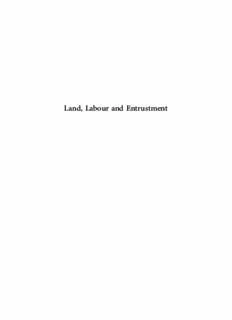
Land, Labour and Entrustment: West African Female Farmers and the Politics of Difference PDF
Preview Land, Labour and Entrustment: West African Female Farmers and the Politics of Difference
Land, Labour and Entrustment African Social Studies Series Editorial Board Martin R. Doornbos, Institute of Social Studies the Hague Carola Lentz, University of Mainz John Lonsdale, University of Cambridge VOLUME 21 Land, Labour and Entrustment West African Female Farmers and the Politics of Difference By Pamela J. Kea LEIDEN • BOSTON 2010 Cover illustration: Title: “3.2 Mile Trek to Unhealthy Water” © Copyright: Gil Garcetti 2006 This book is printed on acid-free paper. Library of Congress Cataloging-in-Publication Data Kea, Pamela. Land, labour and entrustment : West African female farmers and the politics of difference / by Pamela Kea. p. cm. — (African social studies series ; v. 21) Includes bibliographical references and index. ISBN 978-90-04-18232-5 (pbk. : alk. paper) 1. Land reform—Gambia—Brikama. 2. Women farmers—Gambia—Brikama. 3. Contract labor—Gambia—Brikama. I. Title. II. Series: African social studies series ; v. 21. HD1333.K43 2010 338.1082’096651—dc22 2010006583 ISSN 1568-1203 ISBN 978 90 04 18232 5 Copyright 2010 by Koninklijke Brill NV, Leiden, The Netherlands. Koninklijke Brill NV incorporates the imprints Brill, Hotei Publishing, IDC Publishers, Martinus Nijhoff Publishers and VSP. All rights reserved. No part of this publication may be reproduced, translated, stored in a retrieval system, or transmitted in any form or by any means, electronic, mechanical, photocopying, recording or otherwise, without prior written permission from the publisher. Authorization to photocopy items for internal or personal use is granted by Koninklijke Brill NV provided that the appropriate fees are paid directly to The Copyright Clearance Center, 222 Rosewood Drive, Suite 910, Danvers, MA 01923, USA. Fees are subject to change. printed in the netherlands In loving memory of my brother Robin (1971–1988) CONTENTS Acknowledgements ............................................................................ xi List of Figures ..................................................................................... xiii List of Tables ...................................................................................... xv Glossary of Main Mandinka Terms ............................................... xvii Chronology of Political Events ........................................................ xix Chapter One Introduction ............................................................ 1 Introduction ................................................................................... 1 Entrustment: Hosts and Strangers ............................................. 4 Agrarian Labour ............................................................................ 7 Agrarian Clientelism ..................................................................... 11 Political Clientelism ...................................................................... 14 Gender, Power and the Politics of Difference .......................... 17 Some Reflections on Methodology and Methods .................... 21 Organisation of the Book ............................................................. 26 PART I HISTORICAL AND CONTEMPORARY NARRATIVES Chapter Two Processes of Agrarian Transformation: Strange Farmers, Groundnuts and the Search for New Modes of Accumulation ................................................................................. 31 The Context .................................................................................... 31 The Expansion of Groundnut Production ................................ 35 – A New Labour Regime ........................................................ 36 – Defining the Sama Manila and the Samalaa .................. 38 – The Samalaa as Gendered Male ......................................... 44 Groundnuts and the Demise of Cereal Production ................ 46 – The Rise and Fall of the Groundnut Industry ................. 48 Strange Farmers and the Political Economy of Groundnut Production ................................................................................. 50 – Patrimonialism ...................................................................... 51 New Modes of Accumulation ..................................................... 52 viii contents The Expansion of Horticultural Production ............................. 55 Conclusion ...................................................................................... 57 Chapter Three Narratives of the Founding of Brikama: Hosts and The Affirmation of Social Identities ........................ 59 The Mandinka ................................................................................ 62 The Founding of Brikama ............................................................ 66 The Supposition of Priority in Settlement ................................ 71 The Setting ...................................................................................... 74 The Old Quarter: Placing Host-Stranger Distinctions ............ 77 – Suma Kunda .......................................................................... 80 The Kunleyo .................................................................................... 84 The Old Quarter: Local Politics and Patrimonial Networks .................................................................................... 87 Conclusion ...................................................................................... 90 PART II ACCESSING LAND AND LABOUR: ENTRUSTMENT AND AGRARIAN CLIENTELIST RELATIONS Chapter Four The Practice of Daily Life: Greetings and the Social Relations of Agrarian Production ................................... 95 Greeting and the Practice of Daily Life ..................................... 96 – Kundalu .................................................................................. 98 The Social Relations of Agrarian Production ........................... 102 – Male Farmers: The Rainy Season ....................................... 106 – Female Farmers: The Dry Season ...................................... 108 – Female Farmers: The Rainy Season ................................... 111 The Provision of Labour: Sinkiro, Children and Kafolu ......... 113 – Sinkiro ..................................................................................... 113 – Children ................................................................................. 115 – Kafolu ...................................................................................... 119 Conclusion ...................................................................................... 124 Chapter Five Hosts and the Acquisition of Land ..................... 125 Introduction ................................................................................... 125 ‘Badjie versus Bojang’: Competing Interpretations of Customary Law ......................................................................... 126 contents ix – Customary Land Law ........................................................... 131 – Ownership and Usufructuary Rights ................................ 133 Female Farmers and the Acquisition of Land .......................... 137 – Affinal Ties ............................................................................. 137 – Inheritance ............................................................................. 140 Conclusion ...................................................................................... 143 Chapter Six Female Agrarian Clientelist Relations and Entrustment .................................................................................... 145 Introduction ................................................................................... 145 Clients’ Strategies for Acquiring Land ...................................... 145 – Concerted Attempts to Access Land ................................... 152 Why Hosts Lend Clients Land .................................................... 153 – Increased Diversification of Production ............................. 158 Female Agrarian Clientelist Relations and Sama Manila ...... 161 Conclusion ...................................................................................... 163 PART III THE POLITICS OF DIFFERENCE Chapter Seven The Changing Relations of Agrarian Production and the Politics of Difference ................................ 167 Introduction ................................................................................... 167 Communal Gardens and the Maintenance of Host-Stranger Distinctions ............................................................................... 167 Youth, Education and Intergenerational Relations ................. 177 Conclusion ...................................................................................... 185 Chapter Eight Conclusions ........................................................... 187 Karafoo and Agrarian Clientelism ............................................. 188 Political Clientelism ...................................................................... 192 Youth and the Changing Relations of Agrarian Production ...................................................................................... 194 Appendix A ......................................................................................... 199 Appendix B ......................................................................................... 203 Bibliography ........................................................................................ 205 Index .................................................................................................... 217
Description: